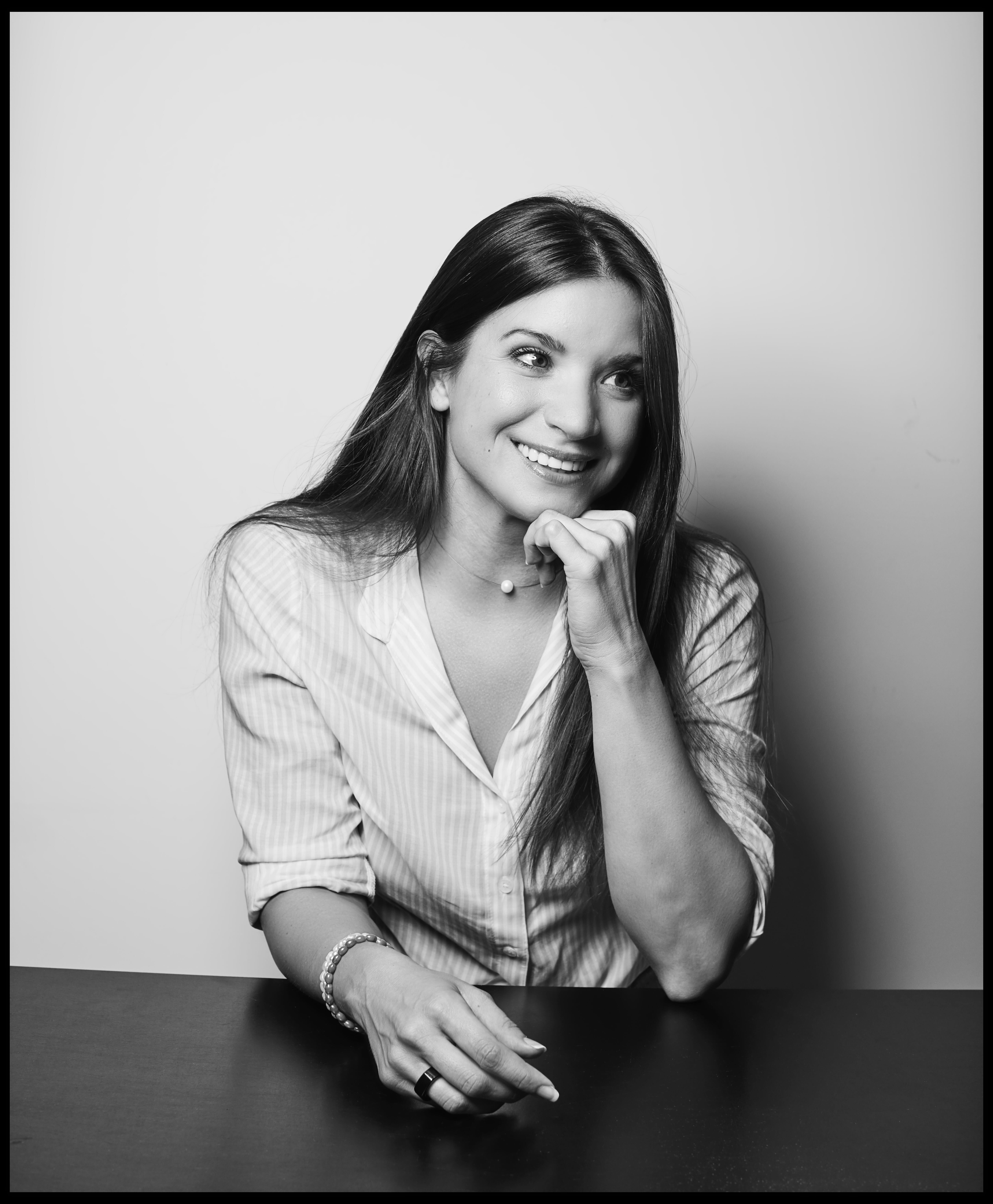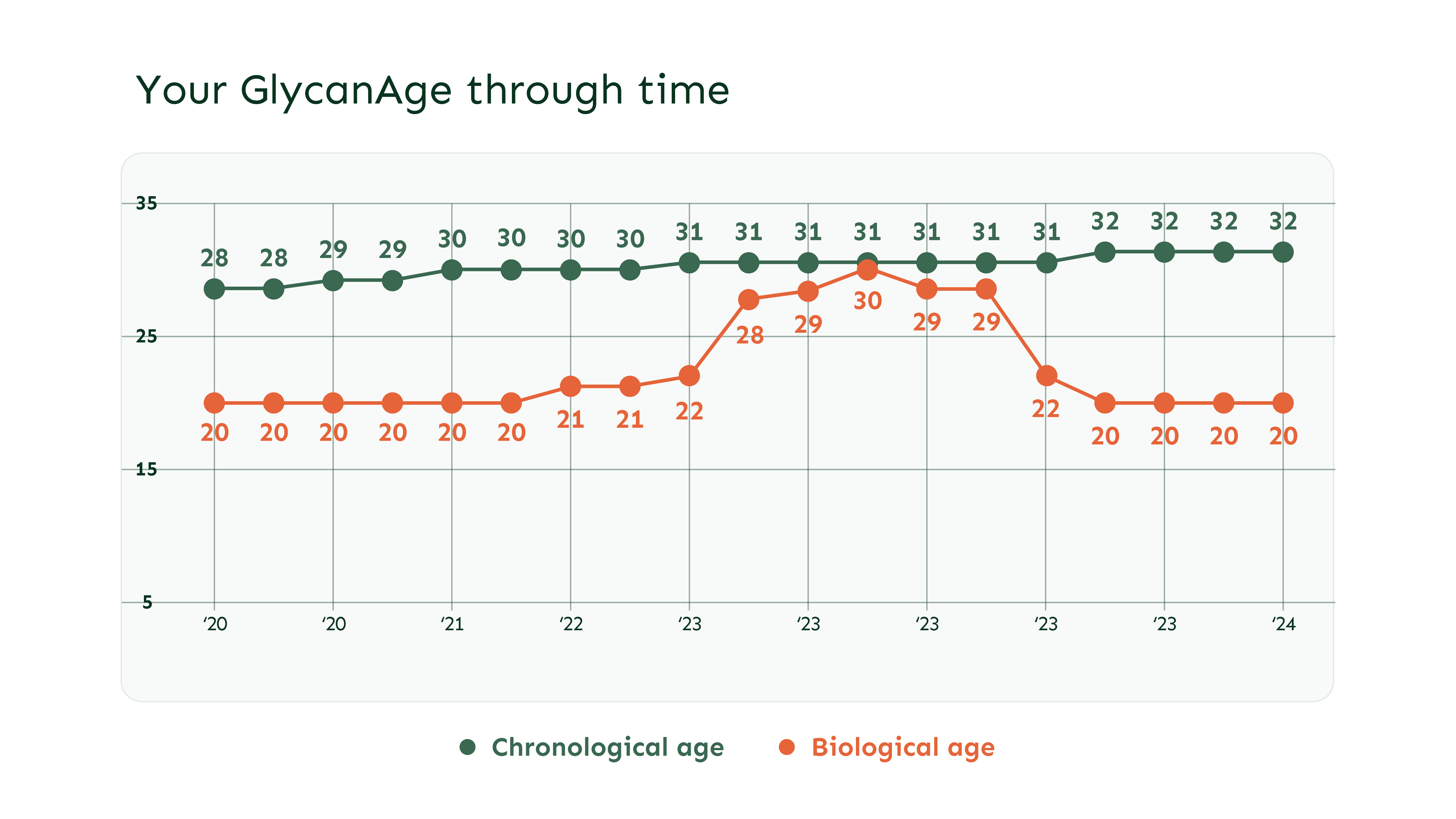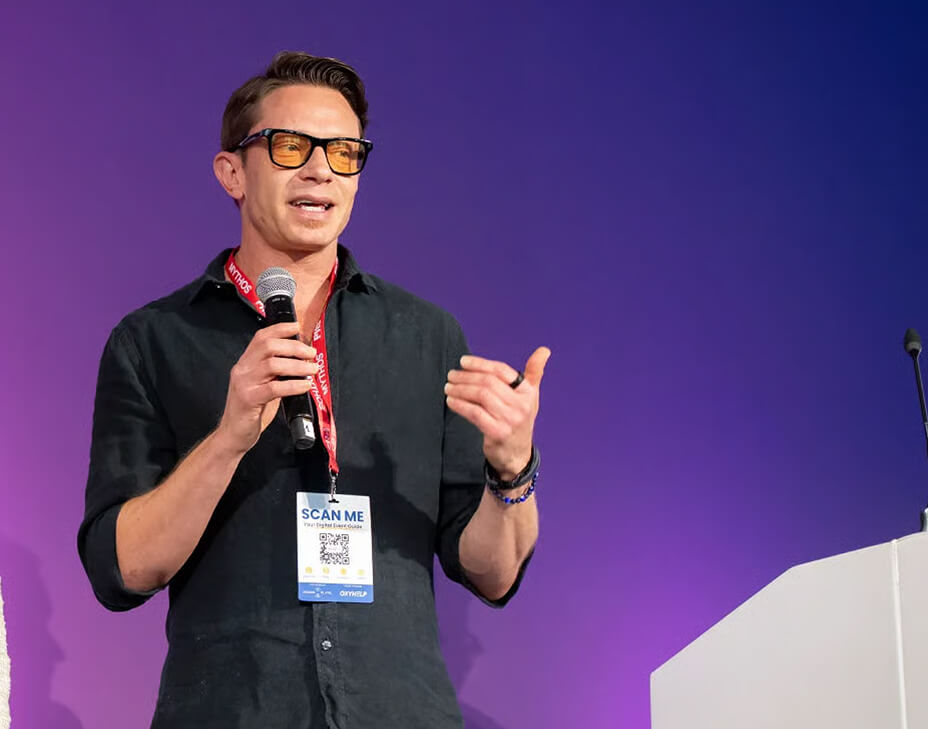CEO Nikolina Lauc: From Overcoming Trauma to Shaping the Future of Longevity
Discover how our CEO Nikolina Lauc turned personal trauma into a powerful journey of healing and resilience. In this candid interview, she shares insights on mental health, the impact of stress on our daily lives, and her vision for the future of the longevity industry.

If you’ve ever wondered if our CEO Nikolina Lauc practices what she preaches, the answer is a resounding yes. Beyond just talking about her favourite biohacks, in this heartfelt interview, she shares how a breakup led to a decline in her mental health and a bad GlycanAge result. Find out how she got through it and what she thinks about the future of the longevity industry.
I'm guessing that you are the person who's tested their GlycanAge the most out of everyone else.
I think Gordan takes the number one spot due to his consistent testing every few months for over a decade.
I remember when I was 19 and he was telling me that this could be a product that we could put on a shelf of a wellness store. Nobody knew what the application for this would be.
My first testing experience was completely different to what we have now. I was 24 chronologically and I had to go to the lab where they literally drew my blood. We didn't have those little finger pricks then, and I had to wait six months for my result.
My result was 20, and I did it again a year later, in the same way. It went up to 21 and I remember being upset I aged a year. I was 25 chronologically, but it went up a year, and I knew right there and then that I didn’t like it.
I was working in another company, a real estate startup, and it was really stressful. There were a few of us, and we were dying. Even though we were doing pretty well commercially, we were all on the brink of burnout.
With that came a lot of gut issues because I was stress eating. When you’re anxious all the time, you crave sugar so that it gives you a kick of energy. Since I wanted to make a change, I started with my mental health and I tried giving meditation a try.
I scheduled myself into this meditation course and there was a year-long waiting list.
Once the wait was over, I was in an even worse place. I haven't had a holiday in God knows how many years. And I met Zorrie two weeks before but we clicked so well and she basically said - whatever you have going on, I’ll take over.
We redirected everything to her phone and she kept saying - what’s the worst that can happen? Nobody is going to die.
Well, she was right! The worst thing that happened was that one person got locked out and entered the property through the window.
That was the first time I could actually delegate to somebody and rely on them. Before that, I had a business partner that I couldn't rely on. I had to do everything myself. It wasn't really a partnership, and it ended really tragically at the end. But anyhow, it was a good lesson.
So I came back from this retreat, and nobody died.

And you know what, I didn't feel different. Nothing changed in my environment. I was still in a very high-scaling company with lots of customers and revenue coming in, but very little management and I was pretty much handling everything.
But I wasn't stressed. All of these things weren’t getting to me anymore.
The retreat fixed my stress response. I would still feel bad while stressful things were happening, but I didn't cling to the feeling afterwards. For example, if somebody would shout at me, 20 minutes later, I would be completely fine, because it was done. My relationship with stress has completely changed.
The next time I tested, my GlycanAge was 20. By that time, the testing process changed since we had the dry blood card and I could just mail it in. The results also came much quicker.
My result was 20 for a good amount of time. Even during the pandemic, when I was exercising way less. But then in just a year, my GlycanAge went up by 10 years.
It was triggered by a relationship breakup. So for the first time, my GlycanAge met my chronological age.
For a short period of time, I didn't eat or sleep much, because the breakup had triggered a trauma response, but I thought I was going through burnout, so I started therapy.
It helped me figure out that it wasn’t a burnout, but I was pre-empting the breakup. I had this fear I didn’t recognize, which was abandonment. That triggered a childhood trauma for me that I didn't know about.
My therapist is amazing. She never labels anything, so she never said that I had abandonment issues, it was just a process of having to sit with my feelings.
I was always the one leaving, whether it was a relationship or a friendship, so I've never experienced this feeling of being left. That was the most painful part.
The thing is, my parents had kids very young. My dad was 20 and my mom was 24 and I was born during a war so when I was nine months old, they decided to keep me in a lab in Germany where my mom was working. She got a crib and would bring me to her work every day.
But the people in charge decided that kids were not allowed in the lab, even though dogs were. So they shipped me off to my mother's grandparents.
Then my brother Filip was born. He's two years younger than me, and he was born with a congenital heart condition.
So then all of the attention was on him and I was a small baby that everybody else was taking care of. That’s the trauma I had to work through.
You can't relive a feeling unless somebody triggers that for you, and it felt like dying. Because as a small baby, when you're abandoned, you know there's a risk of you dying. But when you're an adult, you can survive.
Having the feeling triggered in my adult years, helped me finally process it.
I'm actually very grateful to my ex for giving me that feeling. Because I don't know how I would have lived it otherwise. Now I am finally emotionally available.
It was a hard lesson to learn, but I came out of it better off. Because I had a chance to process these things, now I have less fear of it happening in the future and I can be more emotionally available.
I think honestly, we have a lifetime of work to do around mental health. I think it’s as important as exercise. Life is never going to be perfect, but unless we process things when they're happening we can’t be truly free.
Wow, that was brutally honest. Thank you so much for sharing that. Is your GlycanAge 20 again?
I'm 20 again.

There's no in-between for you.
No, there's good or bad.
It took maybe about eight months, but my therapist really saved me in that period, because I think I would have spiralled into depression for a very long time if she hadn’t been there for me.
While talking to you I realized that you’re a perfect example of how mental health can have both a negative and positive impact on your biological age.
That's very true.
I think that mental health is a pillar of health.
If your mental health isn’t in order, then nothing else will be. I can take a gazillion supplements, but if my head is not in a good place, it won’t make a difference.
Outside of mental health, did you use any other biohacks to lower your biological age?
As I've mentioned before, I had gut issues while working at a previous company and it took two years to fix them. I had to start eating real food, and since I wasn't stressed all the time, I think my gut was finally adjusting.
Stress can manifest in so many different ways. If you're under constant stress, you shut down all of these things that aren’t necessary for survival. We say - if you're running from a lion, you don't need to digest food, fight viruses or reproduce, you need to find protection.
So your immune system gets suppressed. You don't need to reproduce, so your reproductive system shuts down. Everything is connected to stress.
When I think back to it, I used to have all these skin conditions. If I ate specific food, my skin would get all red. I couldn't figure out what I was allergic or intolerant to, but luckily it all went away.
Now I can eat pretty much everything.
I still select the healthy options, but if I’m travelling and don't have a lot of choices, I can eat a bagel with bacon and cheese, without any crazy reactions.
And have you maybe tried any other experiments?
I take all kinds of supplements. I think mainly I'm trying to limit the damage. When you're running a young company you have to stretch yourself to some kind of inhuman level, in order to achieve success.
One thing I’m constantly working on is optimizing sleep. It’s not perfect, but I get 7 to 8 hours whenever there is an opportunity. I have this cooling bed that I really like, it puts me into hibernation.
In my last year of university, I had a period when I didn't sleep for six months. I was so anxious and stressed. I would go to bed and I would just not sleep the whole night.
I thought I had insomnia and I got this book about a woman who couldn't sleep for 14 years.
She explained how she tried every sleeping pill under the sun, and every sleep programme/aid there was, and came to the conclusion that when you're taking all of these things for sleep, you're just reinforcing that you have a problem.
Since she went to bed one day, and didn’t sleep well, the next day, she would be in bed, remembering how she didn't sleep well, and recreating it over and over again. And at the end of the book, she realizes the only thing keeping her awake is her mind.
I read this whole story of this woman who couldn’t sleep for 14 years and everything she tried. I put down that book, I went to bed and I slept like a baby ever since. I have never kept myself awake since reading it.
How does your workout routine look like these days?
I go to the gym twice a week, on a good week. I build muscle very easily. If I stand up now, I have very defined legs, and I can't say I do much for it.
I like to keep an eye on my hormones. I have slightly high testosterone for a woman, which is a positive thing in regard to athleticism. However, there is a downside to this, which is that it can lead to PCOS, which in turn raises your risk of infertility and diabetes.
I'm very proactive about both of these issues, so I don't have to worry about them yet.
Interestingly, one research found that Olympic female athletes have a higher incidence of polycystic ovaries - 37% compared to women in general - 20%. Even more female athletes may have PCOS, but they haven't been diagnosed yet.
Also, I metabolise iron pretty well so even though I eat very little meat and a lot of vegetables I have pretty good levels of iron.
Looking at GlycanAge matters, but there are so many other things you can measure nowadays that give you a lot of data on your body and what should work for you.

If you want me to go into it I guess when I think of longevity now, I think more about fertility. I froze my eggs for the first time when I was 28 and then again at 32.
I might need to do it another time because even though I don't have a PCOS diagnosis, I had a PCOS response, meaning I had a lot of eggs but they were immature.
Any doctor I go to says they can't diagnose me with PCOS because you need to meet 2 out of the 3 criteria - an irregular cycle, specific hormone levels, and the clinical picture. So it has to look a certain way on the scan.
And I don’t meet the criteria.
I'm trying to delay family until later in life because, for one, I don't want to repeat my parents’ mistakes. Also, I want to make sure that I have the right partner and lastly that my mental health is great.
I think that will happen later in life because there are a lot of sacrifices I need to make for the company. Having kids at 40, means I need to freeze a certain amount of eggs to have a good chance. And there's no guarantee.
Well, I mean, not just to conceive, but also to be a mom who's around.
So that's my motivation for longevity. That's why I’m experimenting with some longevity supplements that work in mice or yeast but have not been proven in people, like Urolithin A and NAD.
My plan is to take these for a specific amount of time before my next egg-freezing appointment and see if they give a better outcome. That will be my criteria for whether these are good longevity supplements or not.
I’m coming at it from a fertility standpoint. My biological age from the perspective of chronic inflammation and the immune system is good, there is nothing more for me to optimise there, so my criteria for a longevity supplement is whether it can help me with fertility.
What are some of your favourite success stories that you heard about from clients or partners who use GlycanAge in their practice?
Well, of course, a lot of it is around menopause and hormone replacement therapy. The most impactful stories are when somebody finally starts taking hormones after being in perimenopause, even going into menopause.
Years and years of symptoms that they don't even want to talk about and with HRT they finally get their life back. And also their GlycanAge really improves.
Adele Martin also has an amazing story. Her doctors didn't see the positive change with estrogen and then realized that she had a cancer diagnosis, a very early stage of myeloma, the earliest you can catch it. So I think that one was very powerful.
I try to probe people to find out their motivation for longevity.
There are times when I don’t like what I hear, like when I met an investment banker who wanted to do our test to figure out how much life insurance to take out. He was an alcoholic and he had a wife and young kids and basically wanted to know how much longer he could destroy himself, while also shielding his family in the case that the worst scenario came to fruition.
That’s the worst reason I've heard to date for wanting to do our test.
The best one was this client with a PTSD diagnosis whose GlycanAge was 20 years above his chronological age.
Our study on people with PTSD showed that they are on average 15 years older. He was also in the early stages of hypertension. There's this very interesting connection between PTSD and hypertension and just kind of general cardiometabolic health declining and he was able to fix that.
So he is in longevity and he tried therapy, which didn't really help, but he ended up doing this FDA-approval trial program called Maps, which is psychedelics-guided therapy.
It made him realise he didn't need any additional therapy because the answer came to him very clearly. The trauma of his childhood made him completely block emotion.
So he lived all of his life up to that point, 45 years without fully experiencing emotion. However, after the Maps program, he could finally feel and express his feelings. He has a chance at a second life, a partnership with someone, kids, and all of the joys of a life fully lived.
That is a really powerful motivation.


